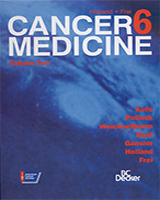By agreement with the publisher, this book is accessible by the search feature, but cannot be browsed.
NCBI Bookshelf. A service of the National Library of Medicine, National Institutes of Health.
Kufe DW, Pollock RE, Weichselbaum RR, et al., editors. Holland-Frei Cancer Medicine. 6th edition. Hamilton (ON): BC Decker; 2003.

Holland-Frei Cancer Medicine. 6th edition.
Show detailsDuring the past half-century, since the advent of modern oncology, children (younger than 15 years of age) with cancer have been a singular focus of treatment and research. The advances among patients in this age group have been among the most dramatic in the history of medicine, and the cooperative infrastructure that has supported this success has been among the most organized in the history of science. In 1971, the National Cancer Act led to another highly organized effort, which has significantly improved the outcome of adults with cancer, in whom the median age was in the sixties. Meanwhile, substantially less attention has been given to the next oldest age group of cancer patients. Cancer develops in 2.7 times more people in the 15- to 29-year-old age group than in those younger than 15 years of age, and the incidence of cancer has increased more rapidly in this older age group than in the younger population. In addition, the relative improvement in the survival rate in young adults has not kept pace with that achieved in younger patients.
Reasons for this lack of progress certainly include issues specific to this age group: some inherent in the disease or the patient (differences in biology or intolerance of therapy), some inherent in the system (treatment by physicians less familiar with the disease, delay in recognition of malignancy, lack of available clinical trials, or failure to enroll patients on available trials), and some influenced by the psychosocial milieu of the patient (unwillingness to participate in clinical trials, delays in seeking medical attention with symptoms of cancer, poor compliance with treatment). A further consideration is that the physical, emotional, and social challenges posed by cancer in adolescence and early adult life are often unique and especially difficult for patients, families, and healthcare providers alike.
In contradistinction to younger and older patients with cancer, until recently adolescents and young adults with cancer have had no national program to address their special problems. This review describes these issues relevant and specific to adolescents and young adults with cancer and their caregivers. The ultimate goal is to heighten awareness of a relatively neglected group of patients who, during the next half-century, deserve better.
Contents
- Definition of Older Adolescent and Young Adult
- Epidemiology
- Diagnosis
- Treatment
- Lack of Participation in Clinical Trials
- Survival
- Summary
- References
- Special Considerations for Young Adults and Older Adolescents - Holland-Frei Can...Special Considerations for Young Adults and Older Adolescents - Holland-Frei Cancer Medicine
Your browsing activity is empty.
Activity recording is turned off.
See more...